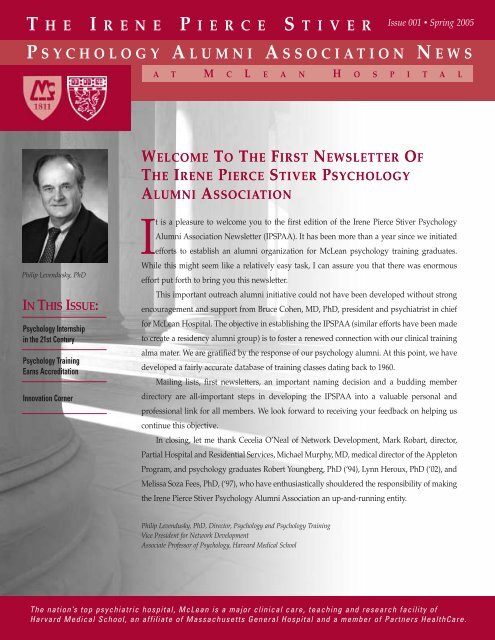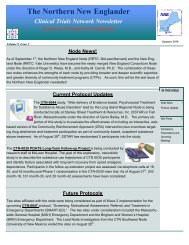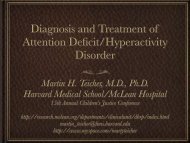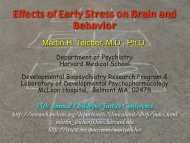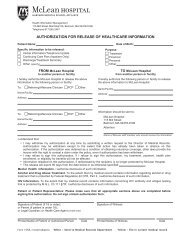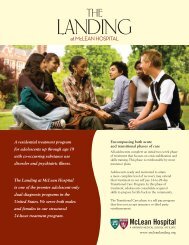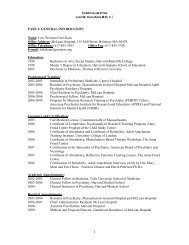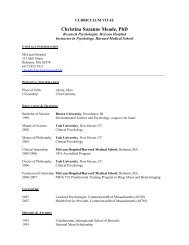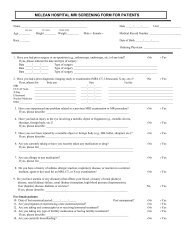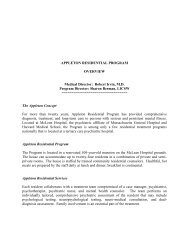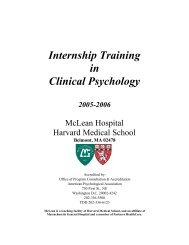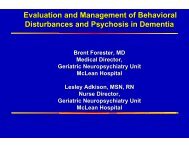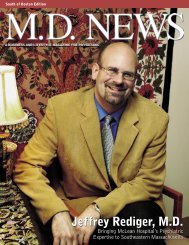Spring 2005 - McLean Hospital
Spring 2005 - McLean Hospital
Spring 2005 - McLean Hospital
Create successful ePaper yourself
Turn your PDF publications into a flip-book with our unique Google optimized e-Paper software.
T H E I R E N E P I E R C E S T I V E R<br />
Issue 001 • <strong>Spring</strong> <strong>2005</strong><br />
P SYCHOLOGY A LUMNI A SSOCIATION N EWS<br />
A T M C L E A N H O S P I T A L<br />
t is a pleasure to welcome you to the first edition of the Irene Pierce Stiver Psychology<br />
Alumni Association Newsletter (IPSPAA). It has been more than a year since we initiated<br />
efforts to establish an alumni organization for <strong>McLean</strong> psychology training graduates.<br />
Philip Levendusky, PhD<br />
Psychology Internship<br />
in the 21st Century<br />
Psychology Training<br />
Earns Accreditation<br />
Innovation Corner<br />
While this might seem like a relatively easy task, I can assure you that there was enormous<br />
effort put forth to bring you this newsletter.<br />
This important outreach alumni initiative could not have been developed without strong<br />
encouragement and support from Bruce Cohen, MD, PhD, president and psychiatrist in chief<br />
for <strong>McLean</strong> <strong>Hospital</strong>. The objective in establishing the IPSPAA (similar efforts have been made<br />
to create a residency alumni group) is to foster a renewed connection with our clinical training<br />
alma mater. We are gratified by the response of our psychology alumni. At this point, we have<br />
developed a fairly accurate database of training classes dating back to 1960.<br />
Mailing lists, first newsletters, an important naming decision and a budding member<br />
directory are all-important steps in developing the IPSPAA into a valuable personal and<br />
professional link for all members. We look forward to receiving your feedback on helping us<br />
continue this objective.<br />
In closing, let me thank Cecelia O’Neal of Network Development, Mark Robart, director,<br />
Partial <strong>Hospital</strong> and Residential Services, Michael Murphy, MD, medical director of the Appleton<br />
Program, and psychology graduates Robert Youngberg, PhD (‘94), Lynn Heroux, PhD (‘02), and<br />
Melissa Soza Fees, PhD, (‘97), who have enthusiastically shouldered the responsibility of making<br />
the Irene Pierce Stiver Psychology Alumni Association an up-and-running entity.<br />
Philip Levendusky, PhD, Director, Psychology and Psychology Training<br />
Vice President for Network Development<br />
Associate Professor of Psychology, Harvard Medical School<br />
The nation’s top psychiatric hospital, <strong>McLean</strong> is a major clinical care, teaching and research facility of<br />
Harvard Medical School, an affiliate of Massachusetts General <strong>Hospital</strong> and a member of Partners HealthCare.
HONORING OUR FIRST DEPARTMENT HEAD<br />
Irene Pierce Stiver, PhD<br />
“<strong>McLean</strong> <strong>Hospital</strong><br />
was fortunate to<br />
have such an<br />
able department<br />
founder and leader<br />
for 39 years, who<br />
oversaw many<br />
changes in the<br />
delivery of<br />
psychological care<br />
and training.”<br />
Bruce Cohen, MD, PhD<br />
President and Psychiatrist in Chief<br />
<strong>McLean</strong> <strong>Hospital</strong><br />
While many alumni are already aware, we thought it important to acknowledge<br />
Irene Pierce Stiver’s passing in September 2000 and pay tribute to the<br />
legacy she left behind.<br />
Irene began her career as the first clinical psychologist at <strong>McLean</strong> in 1952 and the founder<br />
of the hospital’s clinical psychology department.<br />
“She was a highly respected clinician and a highly sought-after teacher, mentor and<br />
supervisor, whose students are leaders in the field of psychology today,” said Bruce<br />
Cohen, MD, PhD, president and psychiatrist in chief for <strong>McLean</strong>. “<strong>McLean</strong> <strong>Hospital</strong> was<br />
fortunate to have such an able department founder and leader for 39 years, who oversaw<br />
many advances in the delivery of psychological care and training.”<br />
Until her retirement in 1991, Irene continued to treat patients, supervise interns and<br />
residents, and develop theoretical constructs that helped advance the understanding of<br />
women’s psychological issues. She was instrumental in expanding the teaching functions<br />
of the psychology department to include a formal internship, begun in 1964, which<br />
received a National Institute of Mental Health training grant in 1966. It was under Irene’s<br />
leadership that the internship received its first American Psychological Association<br />
accreditation.<br />
After her retirement, Irene continued to supervise psychology interns and psychiatry<br />
residents and to serve as a consultant to the staff of <strong>McLean</strong>’s Women’s Treatment<br />
Program. She also maintained an important and longstanding affiliation with the Stone<br />
Center at Wellesley College.<br />
In 1989, she received the Ezra Saul Psychological Service Award for Distinguished<br />
Contributions to Psychology.<br />
Born in New York City, Irene graduated from Brooklyn College and earned a doctorate<br />
at Cornell University where her professional identity was influenced by a number of<br />
leading academics, including Fred Marcuse. She is survived by her beloved husband,<br />
Raymond Stiver.<br />
Irene will be missed by all of us who had the privilege of her influence in our lives.<br />
The <strong>McLean</strong> Psychology Alumni Association is aptly named in her honor.
THE MCLEAN HOSPITAL PSYCHOLOGY<br />
INTERNSHIP IN THE 21 ST<br />
CENTURY<br />
Edmund Neuhaus, PhD, (‘88) Associate Director of Psychology Training<br />
The <strong>McLean</strong> <strong>Hospital</strong> Psychology<br />
Training Program is thriving. Each<br />
year, we receive approximately 150<br />
applications for six internship positions.<br />
Gone is the longstanding ritual of “call day,”<br />
when prospective trainees would learn<br />
where they would spend their intern year.<br />
That process was replaced five years ago<br />
with a computerized match program—one<br />
that brings to <strong>McLean</strong> top graduate students<br />
from across the country. Fortunately for us,<br />
many stay and become members of the<br />
<strong>McLean</strong> faculty. For those who leave, most<br />
go on to tenure track or medical school<br />
academic positions. The <strong>McLean</strong> internship<br />
has an outstanding reputation as a topnotch<br />
scientist-practitioner training site.<br />
In the <strong>McLean</strong> tradition, training focuses on<br />
state-of-the-art psychosocial treatment.<br />
While largely cognitive behavioral, it integrates<br />
other perspectives in fundamental<br />
ways. For example, it includes a psychodynamic<br />
component and it draws on self-inrelation<br />
principles. There are still more<br />
elective training opportunities than hours in<br />
the day, and the supervisory faculty continue<br />
to be of the highest quality. A particular<br />
point of pride is that our interns continue to<br />
rank supervision as one of the best parts of<br />
our program.<br />
Beginning in the 1996-1997 academic year,<br />
Philip Levendusky, PhD, and I assumed<br />
leadership for a fully integrated clinical<br />
psychology internship. The primary training<br />
site is the Behavioral Health Program (BHP),<br />
which is <strong>McLean</strong>’s largest partial hospital<br />
program (700 admissions per year) with<br />
three specialty tracks: MAP (Mood and<br />
Anxiety), GAP (General Adult), and<br />
Borderline Personality. Interns see large<br />
numbers of patients and have substantial<br />
training in both individual and group<br />
therapy in the partial hospital program as<br />
well as in the hospital’s outpatient clinic.<br />
Because of my position as director of the<br />
BHP, trainees are fully integrated into the<br />
clinical program. There are 40 staff; more<br />
than 10+ trainees (six interns, two postdocs,<br />
practicum students, social work<br />
interns and a resident in psychiatry). While<br />
many staff have come and gone through<br />
the years, certain faithful long-serving staff<br />
remain; most notably, Annmarie McCarthy,<br />
RN and Ken Blair. The program is located<br />
in the Recreation Building, which was<br />
beautifully renovated for us in spring 2004.<br />
For those of you who were at <strong>McLean</strong> prior<br />
to 1994: the BHP is a descendant of the<br />
CBTU program and Codman III (which later<br />
became Hill Waverly), which merged in<br />
1994. If you were here before 2000, the BHP is<br />
a result of a merger of MAP and GAP. The<br />
GAP program changed dramatically as<br />
long-term psychotic patients were tracked<br />
into community based services, resulting in<br />
a new focus on short-term managed care<br />
treatment. For those of you who were at<br />
<strong>McLean</strong> prior to 2002, we introduced a<br />
specialty track for borderline personality<br />
disorder, a specialty many of you may think<br />
was long overdue. We have successfully<br />
and productively collaborated with that<br />
program’s leadership, John Gunderson, MD,<br />
and are treating patients from across the<br />
country who actively seek out our program<br />
for the specialized care we offer. The irony<br />
for those of you who trained at <strong>McLean</strong><br />
pre-1994 is that we have a “long-term”<br />
borderline track of two months. Short- term<br />
treatment is now one to two weeks, even at<br />
<strong>McLean</strong>.<br />
While changes continue to occur at <strong>McLean</strong><br />
and in psychology training, one constant<br />
prevails, and that is <strong>McLean</strong> is a great place<br />
to train and work.<br />
Edmund Neuhaus, PhD<br />
While changes<br />
continue to occur<br />
at <strong>McLean</strong> and in<br />
psychology training,<br />
one constant<br />
prevails, and that<br />
is <strong>McLean</strong> is a<br />
great place to<br />
train and work.
NEUROPSYCHOLOGY POST DOCTORAL<br />
FELLOWSHIP PROGRAM<br />
Donald Round, PhD (’97)<br />
Assistant Director, Neuropsychology and Psychodiagnostic Testing Center<br />
Post-Docs from left to right:<br />
Allen Schiller, PhD<br />
Nova University Southeastern<br />
Danielle Dobel, PsyD<br />
California School of Professional Psychology<br />
Boaz Levy, PhD<br />
University of Southern California<br />
The <strong>McLean</strong> <strong>Hospital</strong> post-doctoral fellowship in neuropsychology encompasses<br />
two years of training in child (at the Learning Evaluation Clinic), adult (via<br />
consult requests of referred inpatients and outpatients) and gerontological<br />
(via inpatient duties on the Special Care Unit and referred outpatients) assessment.<br />
Fellows have clinical duties, including daily brief assessments, attendance at rounds,<br />
participation in family meetings and input within a care team approach on an inpatient<br />
unit that specializes in the diagnosis, care and treatment of neurological and<br />
psychiatric conditions impacting the memory, cognition and general functioning of<br />
seniors. Training is intensive, with participation in a host of offerings: the Longwood<br />
Neuropsychology Seminar run by William Stone, PhD; Neurobehavioral Rounds with<br />
neurology and psychiatry residents at <strong>McLean</strong> conducted by Bruce Price, MD, chief of<br />
Neurology; and miscellaneous less formal classes in imaging, brain anatomy, interpretation<br />
of medical lab work, etc. Fellows are also eligible to participate in a range of<br />
seminars, lectures and symposia offered by Harvard Medical School. We are<br />
currently completing interviews of applicants for the start of the fellowship in the<br />
Fall of <strong>2005</strong>; all of whom must have their dissertations completed by that time and<br />
be fully licensable as clinical psychologists (e.g., have completed all of the requisite<br />
course work). While our work is decidedly clinical in orientation; we have had fellows<br />
who were able to carve out time for research – and, as you know, <strong>McLean</strong> offers<br />
ample opportunities for this. We expect that fellows will be putting in approximately<br />
50 hours per week on average to meet their clinical responsibilities.<br />
I was actually the first to complete this fellowship in the summer of 1997. Since then<br />
we have tried to fill two positions every year to meet the hospital’s growing clinical<br />
needs. Past fellows currently hold neuropsychology positions in hospitals in<br />
Los Angeles and Vancouver, teach courses in area universities and are active staff<br />
here at <strong>McLean</strong> (four of us).<br />
U.S. News & World Report consistently ranks <strong>McLean</strong> <strong>Hospital</strong> the nation’s top<br />
psychiatric hospital. <strong>McLean</strong> is the largest psychiatric clinical care, teaching and<br />
research affiliate of Harvard Medical School, an affiliate of the Massachusetts<br />
General <strong>Hospital</strong> and a member of Partners HealthCare, one of the country’s<br />
leading healthcare systems.
PSYCHOLOGY TRAINING EARNS<br />
ACCREDITATION<br />
In 2004 the American Psychological Association (APA) recognized the <strong>McLean</strong><br />
Psychology Internship for its excellence by awarding it a seven-year accreditation.<br />
The accreditation was based on a detailed review of a comprehensive self-study report<br />
and a thorough two-day site visit by an APA accreditation team. Numerous <strong>McLean</strong><br />
faculty, staff and trainees contributed to this successful effort.<br />
“This is the first time the internship has been included in the new seven-year accreditation<br />
cycle. This represents a significant recognition of the outstanding efforts of our faculty<br />
and trainees and will allow us to continue to recruit the top clinical psychology doctoral<br />
students,” said Philip Levendusky, PhD, director of the Psychology Department.<br />
“This is the longest accreditation the APA gives, which speaks to their high opinion<br />
of our program,” added Bruce Cohen, MD, PhD, president and psychiatrist in chief<br />
for <strong>McLean</strong>.<br />
A survey accreditation report issued by the APA noted a number of areas in which the<br />
program excels, particularly its commitment to hands-on faculty supervision.<br />
“The interns report that their supervision is the best part of this excellent program,”<br />
wrote Susan Zlotlow, PhD, director of the APA’s Office of Program Consultation and<br />
Accreditation.<br />
“Every year, interns highlight that supervision is one of the best parts of the training<br />
year, and how impressed they are with the dedication to training and mentoring<br />
exemplified by their supervisors,” said Edmund Neuhaus, PhD, associate director of<br />
Psychology Training.<br />
Zlotlow also commended the program for its ability to provide interns with as wide a<br />
conceptual framework as possible and for developing an excellent system for providing<br />
sequential and graded experiences for interns.<br />
“Interns from previous years report that the training they received is relevant and<br />
useful in their preparation as professional psychologists.”<br />
In closing remarks of her report, Zlotlow acknowledged the hospital for its dedication<br />
to psychology training. “The Committee on Accreditation expresses its appreciation for<br />
your personal commitment and the corresponding support of your administration to<br />
develop and maintain the best possible quality of graduate education and training in<br />
psychology,” said Zlotlow.<br />
WHERE ARE THEY NOW?<br />
C LASS OF 2003-2004<br />
Julien Guillaumot, PhD<br />
email: jguillaumot@mclean.harvard.edu<br />
Address: 1 allei du Foulon<br />
Auxerre, France 89000<br />
Position: Assistant Professor,<br />
American U. of Paris<br />
Doctoral Program: U. Oregon<br />
Michael Christopher, PhD<br />
email: mchristopher@mclean.harvard.edu<br />
Address: 75 Evans Street<br />
Medford, MA 02155<br />
Position: Post-doctoral Clinical Fellow CHA/HMS<br />
Doctoral Program: U. South Dakota<br />
Nicole Noffsinger-Frazier, PhD<br />
email: nicolenoffsinger@hotmail.com<br />
Position: Post-doctoral Clinical Fellow,<br />
Klarman Eating Disorders Center, <strong>McLean</strong><br />
Doctoral Program: U. of Memphis<br />
Sara Hickman, PhD<br />
email: sarahickman@nft.com<br />
Address: 40 E. 76 th Street, NY, NY 10021<br />
Position: Psychologist; National Football League<br />
Doctoral Program: UMASS Amherst<br />
Stephanie Shapiro, PhD<br />
email: shapiro@mindspring.com<br />
Address: 2009 21 st Ave. S. #111<br />
Nashville, TN 37212<br />
Position: Applying for Post-doctoral Fellowship<br />
Doctoral Program: Catholic U. of America<br />
William Jaffe, PhD<br />
email: wjaffee@mclean.harvard.edu<br />
Address: 39 Clinton St., #4, Cambridge, MA 02139<br />
Position: Post-doctoral Research Fellow,<br />
ADATP, <strong>McLean</strong><br />
Doctoral Program: S.U.N.Y at Stony Brook<br />
Class 2004-<strong>2005</strong> (pictured left)<br />
Pictured left to right, top row:<br />
Hyo-Jin Kim from Boston Univ.,<br />
Sherrie Delinsky from Rutgers Univ. and<br />
Christie Rizzo from Univ. of Southern CA<br />
Bottom row, left to right:<br />
Ezemenari Obasi from Ohio State Univ.,<br />
Catherine Tellides from McGill Univ. and<br />
Joshua Hrabosky from VA Consortium
INNOVATION CORNER<br />
Carol Kauffman, PhD (‘78)<br />
M AILING R ESULTS<br />
In 2003, we began forming the Psychology Alumni<br />
Association with an initial mailing to more than 430<br />
Alumni dating back to 1960. The response to this<br />
mailing was extremely gratifying, garnering more<br />
than a 50-percent return. Alumni responses indicated<br />
strong preferences for receiving a Psychology<br />
Alumni Directory (87 percent), a newsletter<br />
(84 percent), <strong>McLean</strong> <strong>Hospital</strong> research updates<br />
(64 percent), Continuing Education mailings and<br />
news on convention socials.<br />
S AVE THE DATE! NOVEMBER 17-20, <strong>2005</strong><br />
Get reacquainted with alumni colleagues at the<br />
<strong>McLean</strong> Alumni social to be held during the<br />
Association for Advancement of Behavior Therapy<br />
(AABT) conference in Washington, DC.<br />
More details to come.<br />
O PPORTUNITY TO P UBLISH!<br />
Ihave long been interested in the application of psychological<br />
principles to enhance productivity and competence. It is<br />
gratifying to see that this is now an area of growing professional<br />
attention. In January 2000, the American Psychologist published<br />
a special issue on positive psychology. Marty Seligman, PhD, and<br />
others wrote a series of articles on how psychology underserves<br />
normal and high functioning individuals. Today, there is an<br />
Annual Summit of Positive Psychology as well as a bi-annual<br />
European conference, numerous texts, handbooks and a stream<br />
of articles focusing on how psychologists can work with their<br />
patients on enhancing skills and emotional well-being. There<br />
have also been research studies showing the efficacy of positive<br />
psychology coaching. (Anyone interested can contact me for a<br />
bibliography at CarolKauffmanPhD@aol.com).<br />
Positive psychology can offer a theoretical and research foundation<br />
for the evolving field of coaching. There are currently a number of<br />
ways psychologists can receive training to include specialization as<br />
coaches. Over the past year, I have transitioned to a coaching<br />
practice. Cognitive therapists as well as relational-cultural therapists<br />
are particularly well suited to make this transition.<br />
The assumptions underlying a coaching orientation have farreaching<br />
implications in theory and in the moment-to-moment<br />
process work. The decision tree one has in mind shifts radically<br />
when basing interventions on assumptions of core health versus<br />
pathology. The relationship also shifts to a co-active model from<br />
an expert/patient one. Seligman describes the primary difference<br />
between therapy and coaching as follows: Therapy focuses on<br />
fixing what is wrong with clients; coaching focuses on enhancing<br />
what is right with them.<br />
Pragmatically, coaching is based on a different contract with the<br />
client. It is non-insurance based, often paid per month in advance<br />
and frequently occurs over the telephone versus face to face.<br />
Massachusetts Psychological Association lawyer, Eric Harris, has<br />
written an excellent contract that clearly distinguishes coaching<br />
from clinical practice.<br />
We are looking for someone to write a “psychodynamic<br />
corner” for the newsletter in an effort to meet<br />
the interests of all alumni. Please contact Lynn<br />
Heroux, PhD or Rob Youngberg, PhD, at psychologyalumni@mclean.harvard.edu<br />
if you are interested<br />
in this opportunity.
TEST YOUR KNOWLEDGE OF MCLEAN TRIVIA<br />
Robert Youngberg, PhD (’94, pictured left); Terry A. Bragg, Archivist<br />
8. What was the original name of Pierce Hall?<br />
a. Hope Hall b. The Gymnasium<br />
c. Presentation Hall d. Amusement Hall<br />
e. The Hall of Cases<br />
1. Which <strong>McLean</strong> building is not linked to the<br />
tunnel system?<br />
a. Upham b. de Marneffe<br />
c. Bowditch d. Mailman<br />
e. Codman<br />
2. In what year did the internship in clinical psychology first gain<br />
approval from the National Institute of Mental Health?<br />
a. 1957 b.1960<br />
c. 1963 d.1966<br />
e. 1969<br />
3. Which building was named after a former <strong>McLean</strong><br />
Superintendent/ Historian who penned a defining treatise<br />
on navigation?<br />
a. Mailman b. Belknap<br />
c. Bowditch d. Upham<br />
e. Appleton<br />
4. In what year was the <strong>McLean</strong> <strong>Hospital</strong> incorporated?<br />
a. 1791 b. 1781<br />
c. 1980 d. 1811<br />
e. 1821<br />
5. Which actress won an Academy Award for her performance<br />
in Girl Interrupted?<br />
a. Gwennyth Paltrow b. Winona Ryder<br />
c. Jennifer Love Hewitt d. Drew Barrymore<br />
e. Angelina Jolie<br />
9. Why did <strong>McLean</strong> <strong>Hospital</strong> leave its original location in<br />
Charlestown?<br />
a. a need for greater space<br />
b. a devastating fire<br />
c. the expansion of the Boston and Maine railroad<br />
d. a more desirable location<br />
e. a generous donation made by a Belmont benefactor<br />
10. What famous landscape architect was involved in choosing<br />
the Belmont site for <strong>McLean</strong> <strong>Hospital</strong> ?<br />
a. Theodore Winthrop b. Frederick Olmstead<br />
c. Sir Reginald dePippo d. Richard Belknap<br />
e. John <strong>McLean</strong><br />
LEVEL OF KNOWLEDGE (answers on back)<br />
8 or more correct: Professor in Psychology<br />
7 correct: Associate Professor in Psychology<br />
6 correct: Assistant Professor in Psychology<br />
5 correct: Instructor in Psychology<br />
4 correct: Needs supervision<br />
Less than 3 correct: Repeat training year<br />
6. Name the first research psychologist at <strong>McLean</strong> <strong>Hospital</strong>.<br />
a. Shepard Ivory Franz b. Bob Schnitzer<br />
c. Fredrick Hoffenmueller d. William James<br />
e. B. F. Skinner<br />
7. Which First Lady attended the Mailman Research Center<br />
dedication?<br />
a. Jacqueline Kennedy b. Ladybird Johnson<br />
c. Patricia Nixon d. Betty Ford<br />
e. Rosalyn Carter<br />
Experimental Psychology Lab, 2nd Floor Men’s Gym, now Rec Bldg, ca.1905
www.mclean.harvard.edu<br />
Ph: 617-855-3656<br />
Fx: 617-855-2550<br />
Those of you who have provided us with your email<br />
address can look forward to receiving future editions<br />
of the Psychology Alumni Association News by email.<br />
Please send any email address changes to us at:<br />
psychologyalumni@mclean.harvard.edu<br />
Trivia Answers (from last page): 1.a 2.d 3.c 4.c 5.e 6.a 7.e 8.d 9.c and d 10.b<br />
<strong>McLean</strong> <strong>Hospital</strong><br />
115 Mill Street<br />
Belmont, MA 02478<br />
ADDRESS SERVICE REQUESTED


